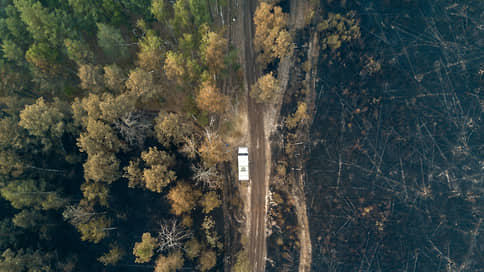Fires return to their usual places – Newspaper Kommersant No. 50 (7495) dated 03/24/2023
[ad_1]

The Ministry of Emergency Situations and Rosleskhoz actually announced the start of a new fire season in Russia. Officials predict the most severe forest fires in the forests of Yakutia, in the Khabarovsk and Krasnoyarsk Territories, in the Irkutsk and Amur Regions. The government of the Russian Federation expects that no more than 5.5 million hectares of forest will burn out this year (exceeds the area of Slovakia) against last year’s 3.3 million hectares. It is noteworthy that in 2022, a special government commission, assembled for the first time since the times of the USSR, was engaged in the coordination of extinguishing forest fires.
The actual start of the new fire season in Russia was announced by the Director of the Department for Supervisory Activities and Preventive Work of the Russian Emergencies Ministry Rinat Enikeev and Deputy Head of Rosleskhoz Alexei Venglinsky. “We expect the main problems, as always, Siberia and the Far East,” said Mr. Venglinsky. According to his forecasts, the most severe fires in the summer of 2023 are expected in Yakutia, in the northeast of the Krasnoyarsk Territory, the north of the Irkutsk Region, the Khabarovsk Territory and the Amur Region. The official also did not rule out active burning of forests in the northern part of the Urals.
According to the Federal Forestry Agency, since the beginning of 2023, 40 forest fires (on 16,000 hectares) have been registered in the Russian Federation, and the fire season has already opened in 18 regions. “The season has already begun in the Trans-Baikal Territory, Buryatia, Primorye has begun to burn,” Mr. Venglinsky listed, expecting the traditional burst of spring fires during the May holidays.
Rinat Enikeev, for his part, promised to check 30 thousand settlements on the eve of the fire season, recalling the “multiple increase” in fines.
So, according to Art. 8.32 of the Code of Administrative Offenses of the Russian Federation for violating fire safety rules in forests, citizens will be fined 15-30 thousand rubles from 2022, and legal entities – up to 400 thousand rubles.
In June 2022, Russian President Vladimir Putin signed a decree on fighting forest fires, instructing the government and governors to reduce their area by at least 50% by 2030 compared to 2021 (then the fire in Russia covered 10.1 million hectares – an area larger than the area of Hungary). At the same time, in August 2022, due to the heat and lack of rain, a fire hazard situation developed in the Central Federal District. Then the smoke from forest fires reached Moscow, and residents began to complain about the smell of burning, ash and smog. The Ministry of Emergency Situations initiated criminal cases on the fact of fires in the neighboring Ryazan region, suspecting local officials of concealing the real extent of the disaster. Prime Minister Mikhail Mishustin then created a government commission (under the leadership of Deputy Prime Minister Dmitry Grigorenko), which took up the coordination of extinguishing forest fires in Russia. Experts recalled that the last time a commission of a similar level met in the USSR was in 1972. Meanwhile, at the end of 2022, the area of forest fires amounted to 3.3 million hectares. At the same time, according to the decree of the government of the Russian Federation, this year the fire in the forests should not cover more than 5.5 million hectares.
Grigory Kuksin, head of the Greenpeace Russia fire-fighting program, says that the fire season “by and large did not stop – lately it has become year-round.”
The expert cited as an example the recent fire in the Astrakhan Nature Reserve, “around which 50,000 hectares of grass and shrubs burned down”, mentioning in this connection the problem of accounting for the area of fires. “Forest fires are actually subject to accounting by Rosleskhoz, and other landscape fires, when grass or peat burns, should be taken into account by the Ministry of Emergency Situations. But they actually do not fall into the reporting, and as a result, the fire seems to suddenly come to the reserve or settlement, ”Mr. Kuksin argues. The expert considers the underfunding of extinguishing forest fires and fallen grass by the population as other historical problems. “Rosleskhoz tried to impose a moratorium on preventive burning of grass in the forest fund, but the regions did not listen and continued to burn,” explains Mr. Kuksin. As a result, Greenpeace Russia expects a difficult season, for which the relevant departments, according to environmentalists, are “very limitedly prepared”: “An economically not very good forecast is added to chronic problems – there is no extra money.”
[ad_2]
Source link








